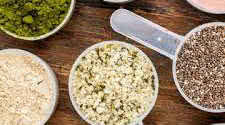Soy Protein vs Casein Protein | Different Digestion and Absorption

Get Better Bodybuilding Results with Proper Protein Sources
Previous fitFLEX articles have explained in detail that soy fails to match up favorably against casein and whey when it
comes to muscle building. On the other hand, one of the touted advantages of soy is a potential positive effect on
cholesterol levels. In past studies, soy protein intake has been positively identified as lessening the incidence of
cardiovascular disease by causing a drop in bad (low-density lipoprotein, or LDL) cholesterol. More recent research is
showing us that having high levels of cholesterol called lipoprotein(a) [Lp(a)] is an independent risk factor for coronary
artery disease and a mark against you in the health battle. Lp(a) varies greatly from person to person, but if yours is
much above 300 milligrams per liter, then your risk of coronary artery disease goes up significantly. Fortunately, you
may have more than one weapon for building muscle while keeping your cholesterol levels from rising.
Many drugs are aimed at lowering cholesterol levels. The most popular of these are statins and bile-acid binders, which
lower cholesterol levels in general but have no effect on Lp(a). Dietary fat intake can cause significant elevations in
Lp(a). Those infamous trans fatty acids found in many margarines that contain hydrogenated vegetable oil can increase your
Lp(a) by 20-70%, even when they comprise only 5-10% of your total energy intake. On the other hand, fish-oil consumption
has been shown to lower Lp(a) by 15% in normal people and 37% in hypercholesterolemic people. In short, some foods help
lower cholesterol and some foods don't.
We are constantly bombarded by the message that soy is good for the heart. Even the Food and Drug Administration has hung
its hat on a heart-healthy claim for foods containing at least 6.25 grams of soy protein per serving. The question is
whether or not soy causes Lp(a) levels to improve, as it does for total cholesterol, triglycerides, LDL and good cholesterol
(high-density lipoprotein, or HDL), and whether casein has positive or negative effects on cholesterol levels as well.
Researchers from the University of Copenhagen compared the effects of soy protein versus casein in nine healthy men between
the ages of 21 and 64 [K. Nilausen and H. Meinertz, "Lipoprotein(a) and dietary proteins: casein lowers lipoprotein(a)
concentration.. as compared with soy protein," American Journal of Clinical Nutrition, 69(3):41 9-25, March 19991. All
participants ate their normal diets for 45 days, then half ate a casein-supplemented diet and the other half ate a soy-supplemented
diet. After a break of at least three weeks to eliminate any crossover contamination of the data, the groups switched protein
supplements. The men had their cholesterol profiles measured during the trial periods. Total protein intake was targeted at
154 grams per day, and the diets were standardized for calcium, cholesterol and calories.
Soy predictably lowered total cholesterol, triglycerides and LDL, but, interestingly enough, so did the casein diet. When it
came to the HDL levels, soy was clearly superior to casein with an 11% increase. The most interesting finding was that the
casein-based diet easily beat the soy diet when it came to the Lp(a) level. In fact, the casein diet lowered the Lp(a)
concentration to an impressive 65% below the participants' regular daily diets. Soy, on the other hand, increased Lp(a)
levels by about 20%.
What does all of this mean to a health-conscious bodybuilder? Based on this small study, casein has a positive effect on
Lp(a). The benefits of soy are mostly in its ability to elevate HDL cholesterol and to lower total cholesterol, LDL and
triglycerides.
In light of these findings, it is obvious that both proteins have positive attributes when it comes to coronary health. It
makes sense to consume both proteins in an effort to get the best of both worlds. Bodybuilders more concerned with increasing
muscle mass than with cholesterol levels can emphasize milk-based protein over soy protein. Until someone does a study on the
two types of proteins in combination and their effects on cholesterol levels, we won't know the composition of the optimum
Lp(a)-lowering and HDL-raising combo. Your best bet for now is to consume a variety of proteins.